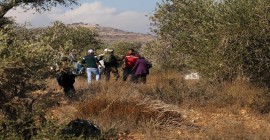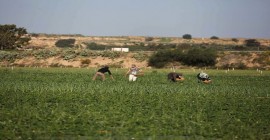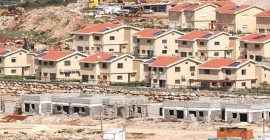Jordan Valley: Steadfastness of Al-Hadidiyah Community Despite Lack of Support
In the beginning of December, the Israeli occupation forces demolished the homes in the Al-Hadidiyah Community in the northern Jordan Valley, confiscated the tents and water pumps of several families, and raked up the dirt road leading to the community under the pretext of not having a building license. These actions exacerbated the suffering of the people in this area that lacks the most basic services and infrastructure.
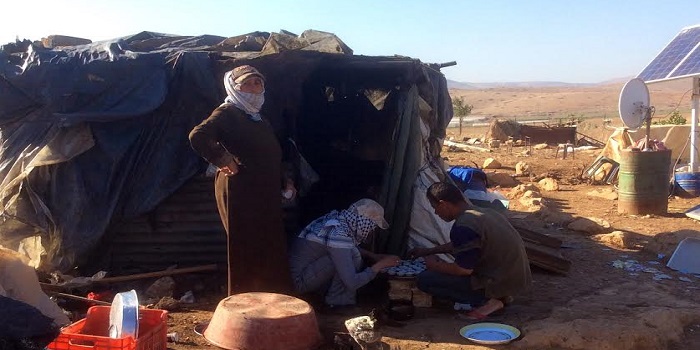
The demolition doubled the hardships in Ruqayyah’s life
Asma Marzouq – Palestine Economy Portal
Translated by: Tamara Barakat
Ruqayyah Bsharat begins her day by igniting the wood to prepare breakfast for her children, next to the small plastic tent in which she and her family are currently living after the Israeli occupation demolished the homes and structures in Al-Hadidiyah community in the northern Jordan Valley, east of Tubas, last week.
The demolition doubled the hardships in Ruqayyah’s life. Ever since the demolition and destruction of the family’s cooking tools and stove, she has been forced to ignite a fire in order to boil water and prepare food several times a day in the cold weather outside of her tent.
This is not the first time that the Israeli occupation demolishes the home of Ruqieh, a mother of ten children, but this is the worst demolition due to its timing in the beginning of winter.
She says, “They want to force us to leave, but we are staying. We were born here and we will remain here with our children.”
Ruqayyah and 12 other families (around 85 people) live in Al-Hadidiyah community located on Palestinian Tabu lands and they have legal lease contracts. The area is classified within Area “C”. There used to be 140 families living in the community; however, in the past ten years, they were forced to move because of the harassment of the Occupation. Families in Al-Hadidiyah community primarily rely on raising livestock and agriculture.
The community lacks the most basic services and infrastructure; there is no water, electricity, or even a paved road to connect the community with the main road. The citizens are forced to transfer water for long distances through pipes, costing them 25 shekels per cup of water, five times the price of a square meter of water that the consumer pays to the public water network in the West Bank.
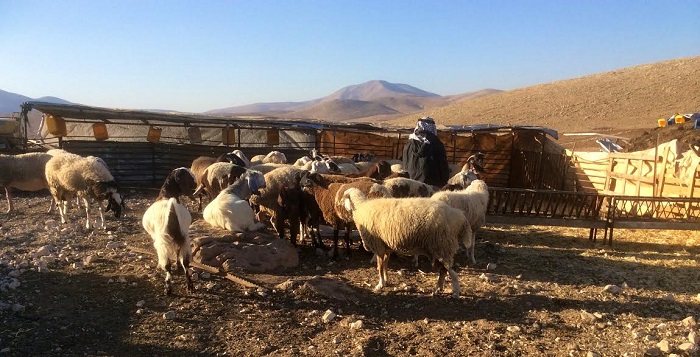
Additionally, there are 37 children in the community. Those who are students have to go on a daily basis to schools in the cities of Tammoun and Tubas and must walk a great distance to do so. This explains why school dropout rates are high, especially among girls.
Ruqayyah explains that her family was stuck many times during the heavy winter days, as they were unable to reach the paved main road through the dirt roads flooded with rainwater.
Restricted Military Zones
Jamal Juma’, the coordinator of the Palestinian Grassroots Anti-Apartheid Wall Campaign, says that Al-Hadidiyah community is among 11 other pastoral communities targeted by the Israeli occupation in the northern Jordan Valley. It aims to empty these areas of their people through declaring them as closed military zones or shooting zones.
Al-Hadidiyah is surrounded by three settlements: Roi’i and Beka’ot settlements in the west and Hemdat settlement in the east. There are also many military outposts that use the lands of the citizens as military training areas for heavy artillery. The military prohibits the citizens from building, planting or raising livestock on these lands under the pretext that they are closed military zones.
Officials have recently visited the community and gave promises to provide help and support to the steadfastness of the people on the land, such as the Chair of the Colonization and Wall Resistance Commission, and the Minister of Local Governance, Hussein Al-Araj. However, Abd Al-Raheem Bsharat, who owns several of the demolished structures, says that he no longer trusts the promises of officials because he had received many of them in the past, but none of the people in the community received a governmental support that suits their level of steadfastness.
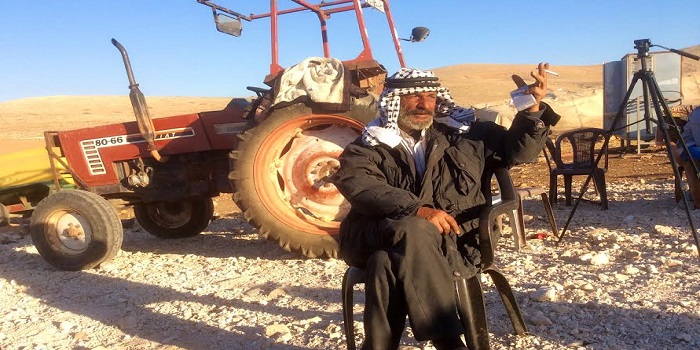
Bsharat (Abu Saqer) received many promises of support to the community from the PA
Bsharat tells the Palestine Economy Portal that the majority of the aid was provided by European organizations and associations. The tents that the community is currently living in were donated by the French organization “ACTED” and the Red Crescent. An Italian organization donated a water pipe to the community, and another French organization donated a school bus for the students.
The Palestinian National Authority’s Colonization and Wall Resistance Commission provides a lawyer to give legal support to the people in Al-Hadidiyah community and the other surrounding communities. According to the Chair of the Commission, Walid Assaf, it also covers the costs of legal measures and fees, among other things.
The Jordan Rift Valley suffers in general from intensive settlement activity, as part of the Israeli occupation plans to separate the Jordan Rift Valley from the rest of the West Bank governorates, in preparation to confiscate around 30% of the overall area of the West Bank from the Palestinian Authority.
